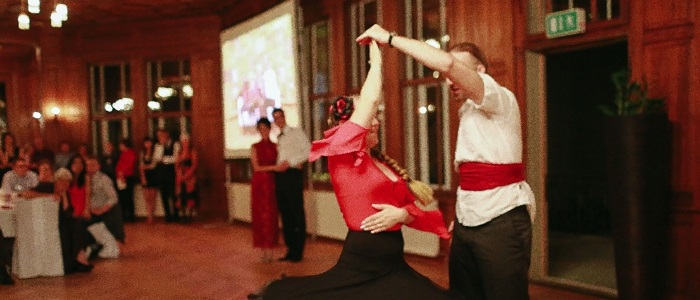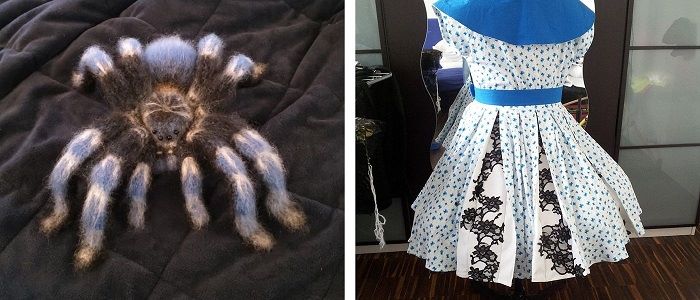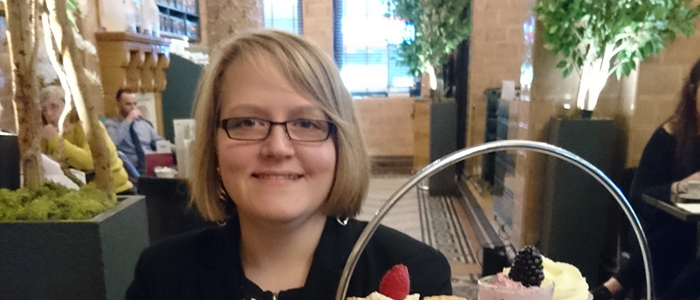"5 minutes with..." Stefanie Krauth (General Practice and Primary Care)
Published: 11 October 2023
SHW disability champion Stefanie Krauth shares the experience of applying creativity and neurodivergence to the research process, a multitude of interests and skills (ranging from competitive ballroom dancing to crochet) and navigating the "river of responsibilities" to achieve balance and wellbeing...
Spend 5 minutes with General Practice and Primary Care's Stefanie Krauth... (Research Associate and SHW Disability Champion)
Tell us a bit about what you do in SHW
I joined SHW on the PERFORM project in the data science work-package which was very interesting as I didn’t originally see myself as a data scientist, despite some good quantitative skills. But my first collaboration with SHW was through the NIHR global health research group on Arthritis in Tanzania. I was based in another school back then, working on the community survey which we had just launched when lockdown struck. We managed to complete it, despite the pandemic, of which I am quite proud, and which is a huge testament to our team in Tanzania.
But in general, I see myself as a highly interdisciplinary global public health epidemiology researcher who really enjoys working with people from a vast variety of backgrounds (geographically and professionally) who also happens to like playing with data and programming. It has given me such amazing insights into the different frameworks of thinking and ways of approaching health-related research questions from different fields – quantitative and qualitative! Each discipline has the tools to answer different aspects of the same question and I wish we would integrate these different approaches a lot more to get a more system-wide understanding how to overcome our big challenges in the world.
What do you enjoy about your role?
As uncomfortable as it is to be in that stage where you move from one short-term project to another, I got to know so many interesting new people and participate in some exciting research. I love being able to apply my creativity and neurodivergent tendency to make connections between seemingly unrelated things in different ways for different projects. Some of the most rewarding work is when you are working to make a project happen and there are the inevitable hiccups and little problems which allow for some creative problem solving and re-thinking sometimes leading to new ideas (so long as there aren’t too many, big issues). Even better is when you get to supervise or mentor young researchers and students and see them develop with curiosity and passion! And my role at SHW has also allowed me to be disability champion through which I have grown a lot and had, again, the opportunity to meet so many amazing people who volunteer their time to improve life for everyone.
What are the challenges?
The challenges are the big laments of working in academia as an ECR. Available positions have so far always been with a funding end date, and this comes with a profound challenge of finding the next project while maintaining a life where you don’t constantly need to start over from scratch, leaving everything and everyone behind. It is causing many ECRs extreme anxiety and is disproportionally impacting people based on their backgrounds (geographical, socio-economical, (dis)ability, caring responsibilities, etc.) especially when Visas are involved and/or social security provides less security than in many other European countries.
What is the best thing about working in SHW?
Most of the people I have worked with and interacted with seem to have a genuine care for others. There is an understanding that work isn’t about constantly being present and available 24/7.
Tell us something we might not know about you
I used to do dance sport (Ballroom and Latin) and even participated in some beginner competitions. But sadly, I haven’t had a dance partner since just when the pandemic started and have not been able to take it back up since.

I enjoy singing in choirs (check out the UofG choral society!) and I have tried my hand at almost any craft I could think of – that black and white coat I often wear is one of my self-made ones. And I do loads of baking, and cooking, and music etc. basically: if there is a new skill to learn I want to try it.

When are you happiest?
Surrounded by family and friends, old and new, preferably around the dinner table hosting a get-together of any sort with food and good conversations and maybe games. Especially in such a multi-cultural setting where everyone loves to show the dishes from their home.
Tell us about something (or more than one thing!) you are proud of
- This is very random, but it remains one of my favourite fun-facts about my career. My very first 1st author paper, based on my MSc thesis, has gone completely viral and has become the number one most read article in PLoS Neglected Tropical Diseases - of all times (this was determined by PLoS a few years back. Unfortunately, they don’t report this metric anymore. I would like to check whether it is still true today). Me and my supervisors even had phone interviews with international papers – during which he offered to send them stool samples as illustrative aid (the reporter did not get the joke). I’ll let you find that one on your own if you’re curious, the language might not suit the HAWKEYE.
- There are a lot of things I am proud of, and I make it a point to celebrate the small wins even in times of challenges. I am currently very proud of the new invisible disability posters we have created and the level of trust from people who confided in me for the creation of the text for them!
If you could have your time again, what might you do differently?
That’s a tricky one! Maybe I would have tried to make more connections to co-write grants and get a long-term project of my own? But I feel that, if I had been able to do that, I would have. There is still something I feel I am not seeing in how these things work and how you get them started.
Any secret – or not so secret! – ambitions?
I would love to get an Ig-Nobel price! That would be the best price to ever receive. I was suggested for it (which only means someone has sent your work to the committee and then they might consider you – or not for any time in the future). but ever since I’ve known about it I really want it. Chances are slim, though. And my research has become slightly too serious for it these days.
Do you have a favourite quote or saying, or mantra by which you try to live your life?
Something I work hard to make my students and colleagues (and sometimes myself) understand:
Doing nice things, meeting friends, hobbies, breaks etc. – these are NOT a reward for finishing your work! Latest after we finish school, we are never fully done with all our work/chores ever again. Responsibilities become a river – new things are permanently added while we work off current ones. There is no sense in trying to scoop the river dry! The pleasurable things in life are the fuel that give us the drive and energy to be in the river and even enjoy the swim. Breaks are the breaths we take between strokes. Neither of the two are optional, rewards, or simply nice-to-haves! You will not be able to swim the length of the entire river on a single breath or without going to shore now and then to fuel up – not even if it’s only until you finished that one important stretch (degree, thesis, grant application…). Learn to understand your work as a constant flow of responsibilities which you can only master if you allow yourself to do enough pleasurable activities without feeling guilty for not working and if you take enough breaks (especially in stressful times) instead of trying to power through to the (intermittent) finish line.
If you would like to appear in "5 minutes with...", do please get in touch (shwadmin@glasgow.ac.uk)! We aim to feature colleagues from across a wide range of roles and grades within our school, both staff and students, research/teaching and professional services.
First published: 11 October 2023
- Stefanie Krauth profile
- General Practice and Primary Care


